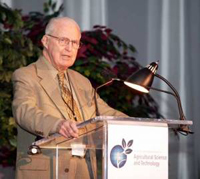|
Aligarh:
In the loving memory of Nobel Laureate, Dr. Norman Earnest Borlaug,
father of great revolution, a commemorative meeting was held on 16th
September, at the Department of Zoology, AMU, Aligarh.
AMU Vice Chancellor, Professor P. K Abdul Azis said that India
regards him for his yeoman contribution in the field of agricultural
sciences. Due to his remarkable contribution, India became self
reliant in rice and wheat production. He had saved our lives than
anyone who has ever lived. He also highlighted the contribution of
Indian agricultural scientist, Prof. M. S. Swaminathan in the field
of food production.
Prof. Pervez Qamar Rizvi, Dean, Faculty of Agricultural Sciences
mentioned that Norman was one of the hundred most influential minds
of the 20th Century and until his death on September 12, 2009, he
continued to devote himself to passing on the next generation his
passion for the science and education as the means to uplift people
who lived in poverty.
Prof. Asif Ali Khan, Dean, Faculty of Life Sciences said that Dr.
Norman Borlaug will be remembered as ‘Father of Green Revolution’
who developed high yielding wheat output and prevented famine in the
developing countries. Prof. Khan pointed out that in 1965, on the
invitation of Dr. M. S. Swaminathan and Indian Government, Dr.
Borlaug offered his advice and soon Indian farmers took up the new
varieties for farming.
Prof. Akhtar Haseeb, Chairman, Department of Plant Protection at AMU
said that this great scientist will always be remembered for his
path breaking research and immense contribution in developing
semi-dwarf, high yield, disease resistant wheat varieties. His
discoveries have been estimated to have saved over 250 million lives
worldwide.
Prof. Haseeb said that his teacher, Prof. Abrar Mustafa Khan had
worked on some scientific research with Dr. Norman.
Dr. Moinuddin of the Botany Department also paid tribute to the
great scientist and disclosed that he had met several times with Dr.
Norman during his research in US.
Prof. Arif Inam, Chairman, Department of Botany and Ms. Muntaha
Qamar, Student, Department of Plant Protection also addressed the
programme.
|




